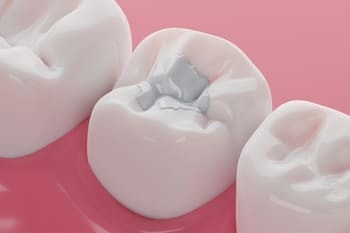Contents
- 1 Understanding Tooth Sensitivity
- 2 Dental Fillings: The Basics
- 3 Why Is My Tooth Sensitive After a Filling?
- 4 Types of Sensitivity After a Filling
- 5 How Long Does Tooth Sensitivity After a Filling Last?
- 6 Managing Tooth Sensitivity After a Filling
- 7 When to Contact Your Dentist
- 8 Preventing Tooth Sensitivity in the Future
- 9 Conclusion
Dental health is integral to our overall well-being, and maintaining it often involves various procedures, including dental fillings. While dental fillings are routine and generally painless, many patients report experiencing tooth sensitivity after a filling. If you’ve recently had a filling and are wondering, “Why is my tooth sensitive after a filling?” You’re not alone. This blog delves into the reasons behind post-filling sensitivity, how to manage it, and when to seek professional help.
Understanding Tooth Sensitivity
Tooth sensitivity is a common dental issue characterized by discomfort or pain in teeth in response to certain stimuli, such as hot or cold foods and beverages. This sensitivity can range from mild to sharp pain, affecting one or multiple teeth. Several factors contribute to sensitive teeth, including enamel erosion, gum recession, and dental procedures like fillings.
Dental Fillings: The Basics
Dental fillings are one of the most common dental procedures to treat cavities caused by tooth decay. The procedure involves removing the decayed part of the tooth and filling the space with materials such as amalgam, composite resin, or porcelain. This not only restores the tooth’s function but also prevents further decay and damage to the affected tooth.
The Filling Procedure

- Examine the Tooth: Using X-rays or other diagnostic tools to determine the extent of decay.
- Numb the Area: Applying local anesthesia to ensure the procedure is pain-free.
- Remove Decay: Use a dental drill to eliminate the decayed portion of the tooth.
- Prepare the Cavity: Clean and disinfect the area to prevent further infection.
- Insert the Filling: Place the chosen filling material into the cavity.
- Shape and Polish: Ensuring the filling fits correctly and matches the surrounding teeth.
While dental fillings are generally straightforward, the procedure can sometimes lead to temporary tooth sensitivity.
Why Is My Tooth Sensitive After a Filling?
Experiencing tooth sensitivity after a filling is a common concern. Several factors can contribute to this sensitivity:
1. Depth of the Cavity
If the cavity is deep and close to the dental pulp (the innermost part of the tooth containing nerve endings), the nerve may become irritated during the filling. This irritation can lead to sensitivity in the affected tooth.
2. Type of Filling Material
Different filling materials interact differently with the tooth structure. For instance, composite resin fillings bond directly to the tooth, sometimes resulting in increased sensitivity compared to amalgam fillings.
3. Bite Adjustment
After a filling procedure, the bite may need to be adjusted. If the filling is slightly high, it can cause extra pressure on the tooth when biting or chewing, leading to discomfort and sensitivity.
4. Nerve Irritation
The dental drill used during the procedure can cause micro-fractures in the tooth or irritate the dental pulp, leading to temporary sensitivity.
5. Allergic Reaction
In rare cases, some individuals may have an allergic reaction to the materials used in the filling, causing increased sensitivity and discomfort.
6. Referred Pain
Sometimes, the sensitivity isn’t localized to the filled tooth but is felt in other teeth due to the interconnected nature of dental nerves.
Types of Sensitivity After a Filling
Understanding the nature of the sensitivity can help determine its cause and appropriate management:
Short-Term Sensitivity
This sensitivity typically lasts a few days to a few weeks after the filling procedure. It’s usually mild and manageable with over-the-counter pain relievers and desensitizing toothpaste.
Long-Term Sensitivity
If sensitivity persists beyond a few weeks or intensifies over time, it may indicate a more serious issue, such as an improperly placed filling or an underlying infection.
How Long Does Tooth Sensitivity After a Filling Last?
For most individuals, sensitivity after a filling is temporary, lasting from a few hours to two to four weeks. During this period, the affected tooth adjusts to the new filling, and any minor irritations caused by the procedure typically subside.
Factors Affecting Duration
- Extent of Decay: Deeper cavities closer to the nerve may result in longer-lasting sensitivity.
- Filling Material: Some materials may cause more initial sensitivity than others.
- Post-Procedure Care: Following the dentist’s instructions can help reduce the duration of sensitivity.
Managing Tooth Sensitivity After a Filling
While experiencing tooth sensitivity after a filling can be uncomfortable, several strategies can help alleviate the discomfort:
 Use Desensitizing Toothpaste
Use Desensitizing Toothpaste
Desensitizing toothpaste contains compounds like potassium nitrate that help block the transmission of pain signals from the tooth surface to the nerve endings. Regular use can significantly reduce sensitivity over time.
Avoid Hot and Cold Foods
Steering clear of hot or cold foods and beverages can minimize triggers that cause discomfort. Opt for lukewarm foods and drinks until the sensitivity subsides.
Soft-Bristled Toothbrush
A soft-bristled toothbrush can prevent further irritation to the affected tooth and surrounding gums, reducing sensitivity.
Over-the-Counter Pain Relievers
Non-prescription pain relievers like ibuprofen or acetaminophen can help manage discomfort until the sensitivity diminishes.
Whitening Toothpaste
Some whitening toothpastes are formulated to address sensitivity. However, to avoid further irritation, it’s essential to choose a product specifically designed for sensitive teeth.
When to Contact Your Dentist
While most cases of tooth sensitivity after a filling resolve on their own, there are instances when you should seek professional help:
Persistent or Severe Pain
If the sensitivity persists beyond a few weeks or the pain intensifies, it may indicate a more significant issue, such as an improperly placed filling or an infection.
Signs of Infection
Symptoms like swelling, redness, or pus around the affected tooth warrant immediate dental attention to prevent complications.
Possible Need for a Root Canal
In cases where the nerve is severely irritated or infected, a root canal procedure may be necessary to alleviate pain and save the tooth.
Preventing Tooth Sensitivity in the Future
Taking proactive steps can help minimize the risk of experiencing tooth sensitivity after dental procedures:
Maintain Good Oral Hygiene
Regular brushing and flossing help prevent cavities and reduce the need for fillings, minimizing post-filling sensitivity risk.
Regular Dental Check-Ups
Routine visits to the dentist at Dental 266 clinic in Burwood allow for early detection and treatment of dental issues, reducing the likelihood of needing extensive fillings.
Proper Filling Techniques
Ensuring your dentist uses appropriate techniques and materials tailored to your dental needs can help prevent sensitivity and other complications.
Conclusion
Tooth sensitivity after a filling is a common and usually temporary issue. Understanding the underlying causes—ranging from nerve irritation and filling materials to bite adjustments—can help you manage and alleviate discomfort effectively. Strategies such as desensitizing toothpaste, avoiding extreme food temperatures, and maintaining good oral hygiene can significantly reduce sensitivity.
However, if sensitivity persists beyond a few weeks or is accompanied by severe pain and other symptoms, you must contact your dentist promptly. Early intervention can prevent more serious complications and ensure optimal dental health.
Remember, dental fillings are routine and essential to maintaining dental health. With proper care and attention, you can navigate post-filling sensitivity and enjoy a comfortable, healthy smile.
References
https://www.sensodyne.com/en-us/oral-health-tips/tooth-sensitivity-after-cavity-filling/
https://www.healthline.com/health/tooth-sensitivity-after-filling
https://www.medicalnewstoday.com/articles/324267#:~:text=Why%20does%20my%20tooth%20still%20hurt%20after%20a%20filling%3F&text=Some%20people%20experience%20tooth%20pain,it%20typically%20subsides%20with%20time.

 Use Desensitizing Toothpaste
Use Desensitizing Toothpaste